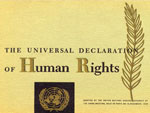News
The Road Ahead
Nov 14, 2015
 You reap what you sow.
You reap what you sow.
Western Europe and the United States have, for several hundred years, enslaved, colonized, and ravaged peoples around the world. We have overthrown legitimate governments and established and supported brutal tyrannies in the name of stability and to support unbridled capitalistic pursuits. While our enviable democracies have enabled a level of peace and plenty which made of us the beacon of hope for the rest of the world, we have taken every opportunity to withhold a share of our good fortune. And in being willing to go to any lengths to protect and enhance our own interests, we have created monsters of much of the rest of the world.
What happened in Paris last night; in New York, Pennsylvania, and Washington, DC, in 2001; in Madrid in 2004; in London in 2005; is going to happen continually and forever. Unless we change.
We know what we have to do, to undo what we have done. It will be a long and bumpy road. If we don’t decide to take it, however, we know the cost, as we already have begun to see our enviable democracies under attack, both from within and without.
Our only avenue to continued peace, liberty, and plenty is to bring peace, liberty, and plenty to the world.
The War on Women, by Sarah Wolfe
Mar 04, 2012
 Is anyone not familiar with Rush Limbaugh’s comments following Rep. Darryl Issa’s refusal to allow a third-year, Georgetown law student to testify before his committee about insurance coverage for contraceptives? Limbaugh decided to conflate her testimony (which she presented, but not to the whole Congress) with “loose” sexual mores. Interesting that someone married four times feels he can play the “morality card.”
Is anyone not familiar with Rush Limbaugh’s comments following Rep. Darryl Issa’s refusal to allow a third-year, Georgetown law student to testify before his committee about insurance coverage for contraceptives? Limbaugh decided to conflate her testimony (which she presented, but not to the whole Congress) with “loose” sexual mores. Interesting that someone married four times feels he can play the “morality card.”
In any event, Limbaugh wasted no time in calling the law student, Sandra Fluke, a slut and a prostitute. Predictably, people on the left or in the center denounced his breath-taking misogyny, while those who hope to trounce Obama in November either seconded Limbaugh’s remarks (Pat O’Reilly, for instance) or made tiny bleating sounds they hoped would be interpreted as criticism by the angry women whose votes they want. The only Republican who used strong language was Scott Brown and he’s running against Elizabeth Warren. His handlers told him what to say.
Let’s shove aside the extraneous: the manufactured kerfuffle over contraception, the manufactured kerfuffle over religious rights (hard to be Catholic? Try establishing a voice as an atheist in this theocracy), and the warp speed employed by Republicans to attack the president for telephoning Fluke.
The situation (Rep. Issa’s turning Fluke away, saying her testimony wasn’t significant; who cares what women think about contraception?) elegantly reflects the way in which the powerful (men) cut the powerless (we know who we are) off at the knees, leaving us voiceless and ashamed. By refusing to allow Fluke to speak they did what men have done for centuries: marginalized us, shut us up, ignored our concerns, slammed the door in our faces and said, “Get outta here.”
And then, as though that weren’t enough, they trivialized Fluke (and, by extension, women in general) by equating her thoughtful analysis of why contraception should be covered by employers with the desire to have endless amounts of sex. That contraception is necessary even if you have sex one time, that the need for it is a public health issue, that the vast majority of women of child-bearing age use contraceptives, that abstaining women also take birth control pills was all thrown by the wayside. In essence, both men and their supporters were saying that women have no right to talk about sex in public, that the expression of a need for contraception by an unmarried woman is shameful and shouldn’t be allowed. Yea, even unto the 21st century doth this continue!
Every few years, civilized people who had begun to believe that things had gotten better are shocked when troglodytes trot out the same, tired sexist and racist beliefs. It’s depressing. Still, this time there was an uproar. And though we figure that Rush will never be thrown off the radio so long as he provokes and has listeners, we can’t but feel that he will be a trifle less careless, a bit more self-conscious about what he says. And for someone as reckless as he is, I imagine that’s a burden. In addition, it must have been inconvenient and time-consuming for his employer to have to deal with angry advertisers pulling their spots. In this mixed-up world, we have to draw consolation from small things.
Till Death Do Us Part
Mar 23, 2009
 The Vermont state legislature was battling over a gay marriage bill last week. When we went to press (last Thursday) the issue had still not been resolved. Vermont, of course, was the first state to permit what we called at the time “civil unions,” presumably to distinguish them from all the uncivil ones that dotted the state. Since then, many states have followed our lead, but only two—Massachusetts and Connecticut—have gone all the way and legalized same-sex marriage. Our Republican governor thinks civil unions are good enough, though he hasn’t yet answered the very good question of why they aren’t good enough for him.
The Vermont state legislature was battling over a gay marriage bill last week. When we went to press (last Thursday) the issue had still not been resolved. Vermont, of course, was the first state to permit what we called at the time “civil unions,” presumably to distinguish them from all the uncivil ones that dotted the state. Since then, many states have followed our lead, but only two—Massachusetts and Connecticut—have gone all the way and legalized same-sex marriage. Our Republican governor thinks civil unions are good enough, though he hasn’t yet answered the very good question of why they aren’t good enough for him.
Coincidentally, we are currently all wrapped up in another terrific HBO series, Big Love. It is about a polygamous union in Utah. Bill Paxton is married to three wives—why do such unions never consist of one woman and multiple men?— and is having a tough time keeping a low profile as he builds a Home Depot-like empire in the Salt Lake City suburbs. As with the Sopranos, you can’t help but root for the ones who are supposed to be the bad guys from time to time, particularly as everyone around them seems even more loathsome.
We like to think we are reasonable enough to listen to both sides; however, we can’t find any argument on the side of those defending conventional marriage that doesn’t seem simply to come down to, “Because we don’t like it.” Gay marriage, plural marriage, common-law marriage, no marriage (another status that brands you a misfit in our society)... Why can’t we just leave each other alone and let us all hook up the way we want to? There must be a dollar at risk somewhere, though we can’t for the life of us figure out where it is.
Still, ten years ago, there was no such thing as civil unions or same-sex marriage anywhere in the land, and today there is. That’s progress. And we’ll leave it there.
Pondering Israel
Feb 17, 2009
 Pity the poor Jew.
Pity the poor Jew.
Plagued by the Egyptians, plagued by the Romans, plagued by the Christians, in the 1880s so plagued by the Russians and their pogroms that a dream is dreamed of their own homeland after millennia in diaspora, and Zionism is born.
Seventy years later, after one last horrendous plague perpetrated by history’s most monstrous villain, a homeland is carved out by displacing fellow Semites from their land, assuring lasting enmity from a billion surrounding followers of Islam who hate the Jews as much as any of their erstwhile tormentors and, in this case, perhaps even with some reason. Irony doesn’t get any more ironical than that.
On top of the irony of the founding of Israel, is the greater irony that these essentially peace-loving and enlightened overachievers have themselves become a plague to generations of Palestinians whom they have displaced. Backed by American political and monetary support (the latter to the tune of $10 million a day1), Israel has developed a nuclear deterrent along with a social and cultural antipathy toward reconciliation with their victims matched only by that of the victims themselves.
An Egyptian murdered Anwar Sadat for making peace with Israel, an Israeli murdered Yitzhak Rabin for supporting the Oslo accords and other peace initiatives. Last week, two right-of-center parties tied in the latest elections, assuring the continuation of perceived irreconcilable differences between the parties.
Former President Jimmy Carter has been in tireless pursuit of peace in the Middle East for decades. His latest book, We Can Have Peace in the Holy Land, sets forth a rather kludged two-state solution involving, among other things, a narrow 35-mile Palestinian corridor between Gaza and the West Bank that would allow Palestinians to travel back and forth between the two sections of their country. Meanwhile, Israel continues to build new settlements on land won in the 1967 war, erect massive walls that will prove to be as onerous to their own people as they are to the people they are supposedly walling out, and tormenting the Palestinians with endless checkpoints and restrictions on services and imports in Gaza that keep its 1.5 million inhabitants in dire need.
It is a problem as intractable as any in history and, if not solved—considering Iran’s threatened nuclear buildup—could result in the Armageddon so fondly anticipated by our own religious fundamentalists.
____________________
1 Former U.S. President Jimmy Carter: “We Can Have Peace in the Holy Land: A Plan That Will Work,” from Democracy Now, February 11, 2009, accessed February 14, 2009
After Life
Feb 02, 2009
 Oprah is 55. Updike is dead. We’re working on our last will and testament.
Oprah is 55. Updike is dead. We’re working on our last will and testament.
It seems mortality is on our mind.
Voltaire said that if God did not exist, it would be necessary to invent him. Some believe God to be a representation of mankind’s desire to lead a moral life, in defiance of our baser instincts, with heaven the ultimate reward for doing so. The Eastern notion of reincarnation is a similar manifestation of that desire, in that one returns again and again until one gets it right, and is then released from the cycle of life.
The philosopher Blaise Pascal made a celebrated wager regarding God and the afterlife. He said the question could go one of four ways: You could believe in God and the afterlife and you could be right, or you could be wrong. Or you could not believe and the same two possibilities apply. He recommended belief because if you did not believe and you were wrong, you would suffer a great deal more than if you did believe, and God and the afterlife proved not to exist.
If there is a God, and one which is not hopelessly perverse, we expect he is more interested in our living a loving, moral, and generous life than whether we subscribe to the unlikely notion that such a being could actually exist.
More to the point, we have a wager that is at least as good as Pascal’s. Substitute “your life on earth” for God and the afterlife. You can believe that that is all there is, or not. And you can be right or wrong. To believe your life on earth is not all there is, and, in the end of that life, to be proved wrong, strikes us as infinitely more sad, infinitely more tragic, than the downside of Pascal’s wager.
____________________
1 Pascal’s Wager, from Wikipedia (accessed January 29, 2009)
Let Us Now Praise ... Sarah Chayes
Oct 31, 2008

There’s a title of a book that has come into parlance now, Clash of Civilizations. There are a lot of people, I think, both in the west and in the Muslim world who believe in the clash of civilizations, who want to see the world as a place dominated by two irrevocably hostile blocks. I don’t want to live in that kind of world. I think that we live in an interconnected world full of rich, flawed, varied civilizations that are inextricably intertwined. So what I am doing in Afghanistan is working for that intertwined world.1Sarah Chayes resigned her position as a reporter for National Public Radio in 2002. She had been covering the fall of the Taliban and the post-Taliban era in Afghanistan. She decided to stay in Kandahar and has since devoted her life to helping the Afghan people find a safe, profitable, and legal route toward self-determination and self-sufficiency. Her cooperative skin-care business, Arghand, established in 2005, has begun to wean local farmers from dependence on an opium crop, and is successfully exporting its natural products to the U.S. and Canada.
Articles by and about Chayes, and additional information and photos, may be found on her web site, SarahChayes.net “Chayes graduated in history from Harvard University in 1984, earning the Radcliffe College History Prize for best senior thesis written by a woman. She served in the Peace Corps in Morocco, then returned to Harvard to earn a master’s degree in History and Middle Eastern Studies, specializing in the medieval Islamic period. She was born in Washington DC, in 1962.”2
In his video interview with Chayes, Bill Moyers remarked, “There’s a thin line we sometimes walk, we human beings, between hope and folly. [Chuckling] Are you very close to that line?”
Chayes replied, “I don’t think that hope is relevant. I think determination is all that counts. You just have to try. It doesn’t matter if you hope you’re going to succeed or not. You have to keep trying.”3
 For keeping on trying, in the midst of a dysfunctional society as dangerous as any on earth; for a determination to make a positive difference in that environment—whether that determination be hopeful or foolish; for her acumen in establishing a business pursuit perfectly suited to the conditions in which she has found herself; and for her belief in a world where we are all “inextricably intertwined,” we award Sarah Chayes our fifth Golden A for Achievement.
For keeping on trying, in the midst of a dysfunctional society as dangerous as any on earth; for a determination to make a positive difference in that environment—whether that determination be hopeful or foolish; for her acumen in establishing a business pursuit perfectly suited to the conditions in which she has found herself; and for her belief in a world where we are all “inextricably intertwined,” we award Sarah Chayes our fifth Golden A for Achievement.Update: View Sarah Chayes’s December 19, 2008, interview with Bill Moyers and read her concurrent guest blog on his site, Negotiating with the Taliban.
____________________
1 Bill Moyers Journal, February 22, 2008 (Accessed October 23, 2008)
2 Sarah Chayes, from Transom.org, undated (Accessed October 23, 2008)
3 Bill Moyers Journal, loc. cit.
With Liberty and Justice for All
Oct 13, 2008
 With a preamble and 30 articles, the Universal Declaration of Human Rights (UDHR), which is 60 years old this month, is considerably shorter, at 1,773 words, than the U.S. Constitution’s 4,449. Though Article 16, Paragraph 3 states “The family is the natural and fundamental group unit of society...,” the UDHR actually enshrines the individual as the primary unit, insulating them even from the occasional tyrannizing of the family.
With a preamble and 30 articles, the Universal Declaration of Human Rights (UDHR), which is 60 years old this month, is considerably shorter, at 1,773 words, than the U.S. Constitution’s 4,449. Though Article 16, Paragraph 3 states “The family is the natural and fundamental group unit of society...,” the UDHR actually enshrines the individual as the primary unit, insulating them even from the occasional tyrannizing of the family.
It only takes about ten minutes to read the UDHR and we should all read it at least once a year, if only to remind ourselves that human society and its institutions—its governments, its laws, its economic systems—exist to serve the individual and that all individuals must enjoy equal access to, and equal rights in, the services of those institutions. Too often, in reality, are we instead called upon to serve them, too often enslaved by tyrannies, too often exploited by oligarchies.
This is what has bothered us about JFK’s exhortation in his 1961 inaugural speech practically since we first heard it: “Ask not what your country can do for you; ask what you can do for your country.”1 No, no, no. Our country exists to ensure and protect our liberty and equality; it is a reflection of our collective will, and it is a fundamental fraud upon the public to imply our “country” requires anything of us except our constant vigilance in ensuring it perform its proper role.
To that end, we would recommend the establishment of a University Declaration of Human Responsibility to accompany and bolster the Universal Declaration of Human Rights. Our declaration is in the singular, as it would only consist of one Article:
Article I. That every human being on the planet will engage in substantive lifelong action to realize the goals of the Universal Declaration of Human Rights, and will not rest until those goals are met.
____________________
1 The New Dictionary of Cultural Literacy, Third Edition, 2002 (Accessed October 11, 2008)
To Be or Not To Be1
Oct 12, 2008
 Unwilling, we enter this world. Often even more unwilling, we leave it. Yet in 2005, 32,637 Americans left quite willingly,2 whether because they were in terrible physical or psychic pain or because they shared the sentiment of actor George Sanders, who at 65 left a suicide note that read, “Dear World, I am leaving because I am bored. I feel I have lived long enough. I am leaving you with your worries in this sweet cesspool. Good luck.”
Unwilling, we enter this world. Often even more unwilling, we leave it. Yet in 2005, 32,637 Americans left quite willingly,2 whether because they were in terrible physical or psychic pain or because they shared the sentiment of actor George Sanders, who at 65 left a suicide note that read, “Dear World, I am leaving because I am bored. I feel I have lived long enough. I am leaving you with your worries in this sweet cesspool. Good luck.”
Death is the great mystery, the “undiscover’d country from whose bourn no traveller returns,”3 the universal fate of all living things: “born but to die.”4 No wonder it breeds such hopes of heaven and of reincarnation. No wonder religions deny its existence so vehemently one might think it is religion’s sole raison d’être to do so.
How willingly, thoughtlessly, copiously we send others to their deaths! And how assiduously we continue to inhibit ourselves from pursuing the bare bodkin when life becomes too terrible or too boring to endure. Suicide, once a felony throughout the U.S., is no longer a crime in any state. However, only in Oregon has suicide been promoted to a right, with assisted suicide legalized. And even there, the right to choose to end one’s life is hedged in by a long list of conditions and procedures.
The Canadian Library of Parliament has released a report, Euthanasia and Assisted Suicide: International Experiences, by Marlisa Tiedemann and Dominque Valiquet. A number of European countries allow euthanasia and assisted suicide. In each country, a great struggle over the legislation occurred between what we may call the Pro-Life and the Pro-Choice contingents. And in every case where the legislation was successful, conditions similar to those in Oregon are required for the act to be legal.
And why should that be so? Why should we not be freely and unconditionally able to choose a painless and peaceful leavetaking, having no choice in our coming hither, and our end so certain? “To cease upon the midnight with no pain:”5 a consummation, I would think, devoutly to be wished, and one which most people wish for. And yet we continue to deny it to ourselves. But we’re getting there. Oregon and a few nations have begun the journey toward death on demand.
It strikes us that if the term “human rights” has any meaning at all, this right must surely be among them.
____________________
1 Our illustration is The Death of Socrates, by Jacques-Louis David. Click this link to view larger versions of the painting.
2 Suicide Statistics at Suicide.org (Accessed October 8, 2008)
3 Hamlet, by William Shakespeare, Act 3, Scene 1, lines 87-88.
4 Essay on Man, by Alexander Pope, line 10
5 Ode to a Nightingale, by John Keats, line 56
Give Them Your Tired
Sep 07, 2008
 Sometimes our country seems to have the soul of a soccer hooligan. The beating death of Luis Ramirez a few weeks ago1 is just the latest in a long history of horrors inflicted upon those who would find a footing in this, “the last best hope of the world.”
Sometimes our country seems to have the soul of a soccer hooligan. The beating death of Luis Ramirez a few weeks ago1 is just the latest in a long history of horrors inflicted upon those who would find a footing in this, “the last best hope of the world.”
We are building a 200-mile-long wall on the Mexican border now,2 as the Israelis continue to build a “separation wall which writhes as a snake into the body of the West Bank.”3 Walls don’t work. They did not work for the Chinese, though they built a Great one; they did not work for the Soviets, though they built a fairly puny one. How many walls do we need to build before we realize this?
In the past few months, the mega-raids by Immigration and Customs Enforcement (ICE) against plants in Laurel, Mississippi,4 and Postville, Iowa,5 have wreaked havoc on the lives of hundreds of poor workers without affecting the lawbreakers who hired them. If we truly wanted to end illegal immigration in this country we could do it overnight, by punishing the employers. However, the employers and the politicians they finance need these immigrants in order to keep wages down—way down. Until an administration is in place which demands a living wage for all full-time workers, we will continue to see ICE cherrypicking the occasional high-profile raid opportunity as a sop to elements of their base (the frightened, undereducated, and embittered) who have been so thoroughly gulled by the current administration as to actually think the latter are doing their bidding.
We were put in mind of all this domestic horror by a statistics-laden and oh-so-unemotional report from representatives of CRA International and Harvard Business School. “Economic Impacts of Immigration: A Survey,“ by Sari Pekkala Kerr (CRA) and William R. Kerr (Harvard) provides a sober examination of the economics of legal immigration, concentrating on the European Union countries, the U.S., and Canada, in that order of emphasis. Their conclusions are a combination of the expected and the not so expected:
- Recent immigrants earn less, but the gap tends to diminish over time;
- The assumption that immigrants are more dependent on social assistance programs is not uniformly confirmed by the literature;
- Most studies find only minor displacement effects on the native population, even following large immigrant flows, with most of that displacement affecting the less educated and previous immigrant populations;
- “[I]mmigrants appear to have a minor positive net fiscal effect for host countries.”
____________________
1“So far like the present...” from All Together Now, July 30, 2008.
2Conservationists warn of border fence’s impac, from The Houston Chronicle, August 22, 2008 (Accessed September 4, 2008)
3Qurei denies any progress in peace talks with Israel, from the Xinhua News Agency, undated (Accessed September 4, 2008)
4After ICE Raid Mississippi Workers Labor to Overcome Racial Division, from Pacific News Service, September 3, 2008 (Accessed September 4, 2008)
5Postville raid prompts immigration reform rally, from the New York Daily News, July 14, 2008 (Accessed September 4, 2008)
Reefer Madness, 2008
Aug 18, 2008
 The Office of National Drug Council Policy, a component of the Executive Office of the President, has published its latest jeremiad against the civilization-threatening evils of weed, “2008 Marijuana Sourcebook—Marijuana: The Greatest Cause of Illegal Drug Abuse,” a report so fearsome, and fear-mongering, they had to name it twice. Their numbers come from the Substance Abuse & Mental Health Services Administration of the Department of Health and Human Services, another component answerable to the executive branch, and so—these days—are advisedly taken with a grain of salt.
The Office of National Drug Council Policy, a component of the Executive Office of the President, has published its latest jeremiad against the civilization-threatening evils of weed, “2008 Marijuana Sourcebook—Marijuana: The Greatest Cause of Illegal Drug Abuse,” a report so fearsome, and fear-mongering, they had to name it twice. Their numbers come from the Substance Abuse & Mental Health Services Administration of the Department of Health and Human Services, another component answerable to the executive branch, and so—these days—are advisedly taken with a grain of salt.
For instance, they say that in 2006 14.8 million Americans smoked marijuana in the month preceding their poll. That’s about 4.8 percent of the population and I can’t believe so few tokers were abroad. Perhaps that’s because I live in Vermont, the only state that shows the consistently highest usage rate (greater than 7.51 percent) across all its counties. Most of the rest of the country shows a usage rate between 4.76 percent and greater than 7.51 percent, which also casts doubt on that 14.8 million/4.8 percent number. Then, of course, there’s the problem of the undercount. I mean, if you were high, would you admit it to some buttoned-down government type with a clipboard?
Usage peaks at age 20 (20 percent), then declines rapidly to the 55-59 set (about 2 percent), takes a slight bubble-up in the 60-64 age group (where I am happily ensconced at present), then drops to a negligible number thereafter (among the oldsters who really know how to keep their mouths shut).
The graphs and figures go on (and on), but the picture isn’t much different than it was in 1936, when the movie came out (“Women Cry For It—Men Die For It”). Meanwhile anyone who’s ever smoked a joint knows it’s a puppy dog compared to alcohol addiction.
So why is marijuana so demonized by the establishment? There are a number of arguments for this. The liquor lobby is the one most often cited. They are aware of the threat posed by marijuana. Stoners are much more likely to crack open a package of chocolate chip cookies than a beer. The travel industry can’t be happy about all those heads tripping out right in their own living rooms. The truth may be less related to economics, however, and a good deal less admirable. And it is to be found in those usage numbers, showing it peaking at age 20. Marijuana is, largely, kids’ stuff, and children are not well-loved, trusted, or cherished in America. In fact, they are more often feared and loathed, and so the long legal arm of the establishment falls most fiercely on them.
Meanwhile, Canada, not a nation known for its predilection for whoopee, has been inching toward full legalization of marijuana for some time now. Ontario started the ball rolling in 2000 by overturning the statute containing a blanket prohibition of marijuana, because it did not make an exemption for medical marijuana uses.1 Since then, public use of marijuana has been increasingly tolerated (as it is in many other countries) and other legal cases have upheld that first one. A Canadian Senate committee on illegal drugs has called for its legalization.2
That is the same Canada which opted out of Bush’s mideast adventure when it failed to gain U.N. sanction. And I’ll drink to that—if I have to.
____________________
1R. v. Parker, 2000 CanLII 5762 (ON C.A.) (Accessed August 9, 2008)
2“Legalize Marijuana Now Says Canadian Senate” (Accessed August 9, 2008)
A Daughter's Death
Jul 27, 2008
 She died a suicide in her barracks, says the Army. However, credible evidence exists that 19-year-old Army Pfc. LaVena Johnson died of a rape, a beating, and a gunshot wound to the head in the tent of a KBR contractor in Iraq. Now, three years later, her grieving parents are still seeking some measure of justice, applying to Representative Henry Waxman to hold hearings into their daughter’s death before his House Committee on Oversight and Government Reform.
She died a suicide in her barracks, says the Army. However, credible evidence exists that 19-year-old Army Pfc. LaVena Johnson died of a rape, a beating, and a gunshot wound to the head in the tent of a KBR contractor in Iraq. Now, three years later, her grieving parents are still seeking some measure of justice, applying to Representative Henry Waxman to hold hearings into their daughter’s death before his House Committee on Oversight and Government Reform.
What I can do. What you can do.
1) Watch and listen to the interview with Johnson's parents and others conducted by Amy Goodman on Democracy Now!
2) Sign a petition to Waxman which has been produced by colorofchange.org, a grassroots Internet organization seeking justice for all “colors” in America.
And Mothers: don’t let your daughters go to war. If they’re young and vulnerable and patriotic, there is much they can do on the home front without sending them into a lawless1 nest of predators.2
____________________
1An End to Iraq Contractor Immunity?, by Patrick Cockburn, on counterpunch.org, June 20, 2008 (Accessed July 26, 2008).
2The Women's War, by Sara Corbett, The New York Times, March 18, 2007 (Accessed July 26, 2008).
The Limits of Sovereignty
Jul 22, 2008
 Just how sovereign is a “sovereign” nation? How far can it go in allowing—or colluding in—the exploition and brutalization of its people before intervention is justified, or even required, by outside powers? This is a question that has been pondered for a long while. In 1948, the U.N. General Assembly ratified the Convention on the Prevention and Punishment of the Crime of Genocide1, which is one of the few instances where the international community has placed formal limits on state sovereignty.
Just how sovereign is a “sovereign” nation? How far can it go in allowing—or colluding in—the exploition and brutalization of its people before intervention is justified, or even required, by outside powers? This is a question that has been pondered for a long while. In 1948, the U.N. General Assembly ratified the Convention on the Prevention and Punishment of the Crime of Genocide1, which is one of the few instances where the international community has placed formal limits on state sovereignty.
Although this resolution is only one among many others which sustain the sovereignty of nations against outside interference, the tide is beginning to turn, and it is becoming an increasingly acceptable stance that national sovereignty involves responsibilities as well as rights.
The House of Commons Library, the British equivalent of the U.S.’s Congressional Research Service, has produced an admirable paper entitled “Reinventing Humanitarian Intervention: Two Cheers for the Responsibility to Protect?” The paper summarizes the historic debate on national sovereignty, and shows how the crises in the 1990s in Somalia, Rwanda, and Kosovo led to the development of the “Responsibility to Protect (R2P)” doctrine.
For an old unreconstructed one-worlder like myself, comments like the following are music to my ears. They come from members of the International Commission on Intervention and State Sovereignty (ICISS), whose work led to the R2P document:
- “We sought to turn the whole weary debate about the right to intervene on its head, and to re-characterise it not as an argument about the ‘right’ of state[s] to anything, but rather about their ‘responsibility’....”2
- “If sovereignty becomes an obstacle to the realisation of freedom, then it can, should and must be discarded.”3
However, with R2P now officially a part of United Nations policy, we may be on the road—finally, actually, effectively, and multilaterally—to becoming our brothers’ and sisters’ keepers.
____________________
1General Assembly Resolution 260 A (III), 9 December 1948
2Gareth Evans, Co-Chair, ICISS
3Ramesh Thakur, Member, ICISS
4“The Responsibility to Protect Darfur,” by William G. O'Neill, The Christian Science Monitor, September 28, 2008 (Accessed July 19, 2008)
5Crisis in Darfur, from the Responsibility to Protect web page, undated (Accessed July 19, 2008)
Something of Values
Jul 11, 2008
 People who don't know where their next meal is coming from tend to have different values from those who have never known hunger or any other deprivation. This would seem like a self-evident statement that wouldn't need 17 pages of single-spaced text detailing a 35-year study to bolster it. But that's the world of the think tank for you, and the results of the World Values Survey (WVS), “Changing Values among Western Publics from 1970 to 2006,” recently published in the journal West European Politics1 can pretty much be summed up by that first sentence.
People who don't know where their next meal is coming from tend to have different values from those who have never known hunger or any other deprivation. This would seem like a self-evident statement that wouldn't need 17 pages of single-spaced text detailing a 35-year study to bolster it. But that's the world of the think tank for you, and the results of the World Values Survey (WVS), “Changing Values among Western Publics from 1970 to 2006,” recently published in the journal West European Politics1 can pretty much be summed up by that first sentence.
The good news is that those changing intergenerational values are becoming more tolerant of diversity, more directed toward self-expression, and less materialistic. And people who hold those more liberal values are maintaining them as they grow older.
The bad news: Liberalizing populations are pretty much limited to North America and Western Europe and other places (Japan, Australia) where the standard of living for most people has managed to creep above the poverty line. Still, it is good to know that as affluence does afflict a people, it renders them, as a group, rather more than less tolerant—and tolerable—than they were before.
____________________
1Volume 31, Numbers 1-2, January-March 2008, pp. 130-146.
We Are One
Jun 05, 2008
 No man is an island entire of itself; every man is a piece of the continent, a part of the main; if a clod be washed away by the sea, Europe is the less, as well as if a promontory were, as well as any manner of thy friends or of thine
own were; any man's death diminishes me,
because I am involved in mankind. And therefore never send to know for whom
the bell tolls; it tolls for thee. [John Donne].
No man is an island entire of itself; every man is a piece of the continent, a part of the main; if a clod be washed away by the sea, Europe is the less, as well as if a promontory were, as well as any manner of thy friends or of thine
own were; any man's death diminishes me,
because I am involved in mankind. And therefore never send to know for whom
the bell tolls; it tolls for thee. [John Donne].
We are all connected. We are all together. What happens to the lowliest happens to the highest. And a day will come when we will be called upon, within our own hearts, to account for the manner in which we have lived our lives, and for the extent to which we have acknowledged, nurtured, and honored our kinship with the earth and its inhabitants.
Amnesty International, an organization that deserves your membership and support, released its 2008 report this month on the State of the World's Human Rights.
Copyright © 2008 All Together Now.